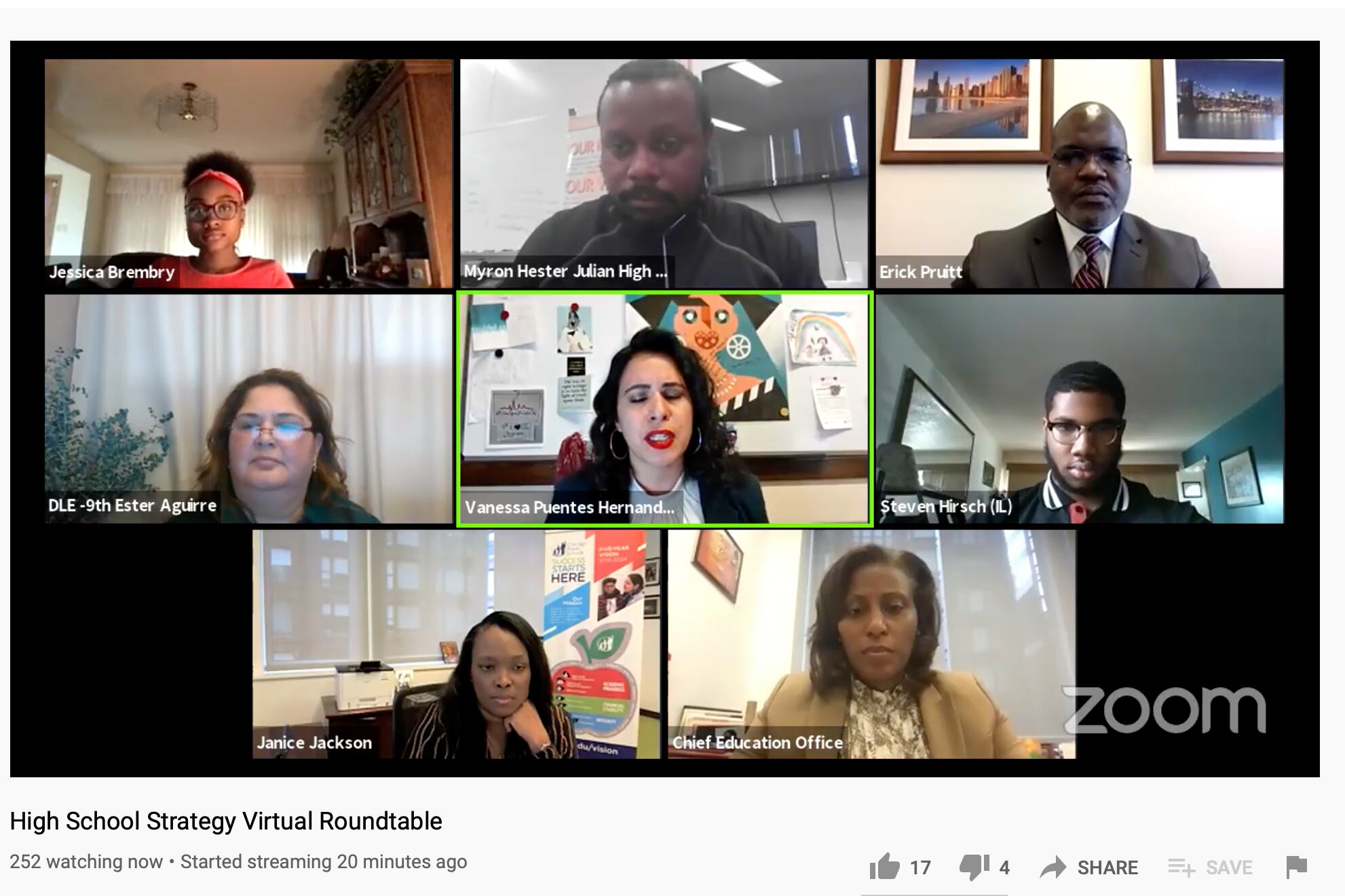Chicago Public Schools will hold 14% of seats at selective-enrollment schools for students with special needs, district leaders announced Tuesday.
The move is intended to ensure students with disabilities are better represented in Chicago’s most coveted public high schools. Currently, almost 15% of CPS students receive special education services, but only about 6% of students enrolled in the city’s 11 selective high schools have special needs.
To support the new students, selective schools will receive additional staff and resources, according to the district.
“Like every initiative in our district, equity is at the core,” schools chief Janice Jackson said at a virtual round table Tuesday, where the policy change was unveiled to district and school leaders and students.
The admissions change is part of a broader, $5 million new initiative called the CPS High School Strategy, which is aimed at improving the district’s high school experience across the board by setting measurable goals for the coming years.Other efforts in the plan include increasing the number of students taking algebra in middle school and expanding access to college-credit courses for Black and Latino students, who remain underrepresented in them despite the district’s push to broaden enrollment.
The high school initiative is a key piece of Jackson’s larger Five-Year Vision for the school district, which she unveiled last year. High schools have been a focus of Jackson’s in recent years. The district has worked to expand popular programs, such as International Baccalaureate and STEM, to compete with private and suburban schools.
District officials said this week that disruption from the pandemic has made it even more important to pursue that vision. They have said they remain focused on protecting the academic gains the district made before the coronavirus hit, including a record five-year graduation rate of 82.5% that district leaders touted in Tuesday’s virtual event.
Chicago’s selective-enrollment schools offered seats to 184 students with special needs for this school year — a number that will increase to 500 next fall. The change will involve dropping the minimum cut store on the district’s selective-enrollment exam.
The district pushed back this year’s deadline to apply to selective-enrollment schools to Jan. 8. It said students will be able to sit for the exam in January or February to be considered for admission next fall. Some families have voiced concerns about the in-person test during a second surge of COVID-19 infections, the Chicago Tribune has reported.
Vanessa Puentes Hernandez, principal of John Hancock High School, on Chicago’s Southwest Side, said teachers at the school voiced concerns about the effect on special education students as it became a selective-enrollment school five years ago. They worried that some of the students might be shut out.
Hancock’s number of special educations did shrink in the following years, Puentes Hernandez said — even as the school has made rapid gains overall, such as graduating more than 90% of its students and seeing 77% of its graduates earn college credit.
She said she welcomes the initiative to increase those numbers and improve the experience of students with special needs.
The district is also looking to leverage virtual learning to increase access to algebra before students arrive in high schools. Many have been unable to enroll because of a shortage of elementary teachers qualified to teach the course.
The district’s new “Early High School Math Initiative” aims to ensure that each elementary school offers at least one algebra course by 2023, almost doubling the number of eighth graders who take algebra to about 6,000. It started with the launch this year of the first Early High School Algebra courses, which offer virtual instruction to more than 500 predominantly Black and Latino students in 80 schools that do not otherwise offer algebra. About 58% of the district’s elementary schools offer algebra now.
“While remote learning has not been successful for many students,” the district said in a statement, “this effort represents a unique instance in which it has created an opportunity to greatly expand access to much-needed advanced instruction.”
Chicago, which has won some recognition for its Advanced Placement program, also will expand its two-year AP Capstone Program, which guides students as they complete and defend a college-level research paper. That’s part of a larger effort to increase the number of Black and Latino students participating in Advanced Placement.
Chalkbeat analysis of Advanced Placement data from 2014 to 2019 showed that, despite significant growth in the number of students taking AP courses over a five-year period, the number of Black students taking AP actually fell by 26%. Over the same time, the number of Latino students in AP courses grew — but at rates that were eclipsed by those of their white and Asian peers. The district pledged last year to do more to boost AP enrollment among Black and Latino students, including expanding a pilot program that aids in recruitment.
Jessica Brembry, a senior at Sarah E. Goode STEM Academy on the Far South Side, said taking AP classes helped her become more independent as a student, better manage her time, and feel a sense of ownership in her learning.
“These are all really important skills all students should have and learn at an early age,” she said.
Myron Hester, principal of Julian High School, a neighborhood school on the Far South Side, said his team is already focused on removing barriers to participation in college credit and advanced math coursework for students, including those involved in the juvenile justice system. The district’s initiative will give the school, which is adding a new arts program this year, new momentum, he said.
“The more we can put on the menu for students and parents,” he said, “the better off our district will be in the long run.”






